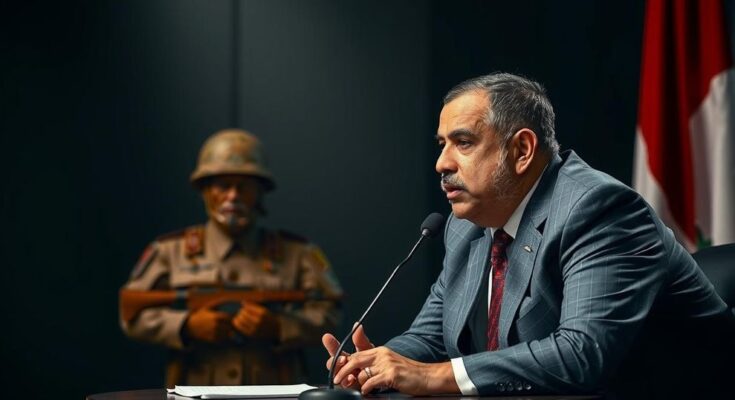Yoav Gallant, Israel’s sacked defense minister, prioritized military focus on Hezbollah in Lebanon over continued hostilities in Gaza. His disagreements with Prime Minister Netanyahu regarding military strategy, particularly after Hamas’s October 7 attack, were pivotal to his dismissal. Gallant’s military experience and strategic insights earned him respect, despite facing accusations related to war crimes amidst the ongoing conflict.
Yoav Gallant, Israel’s ousted defense minister and a distinguished former general, played a pivotal role in shaping the military response to Hamas in Gaza. His recent dismissal by Prime Minister Benjamin Netanyahu illuminates a significant rift between the two leaders concerning future military strategy. Gallant has advocated for a shift in focus toward the northern border with Lebanon, emphasizing the necessity to counteract the threats posed by Hezbollah rather than extending the conflict in Gaza. He articulated that after a year of warfare, Israel’s strategy needed realignment toward Lebanon, which he labeled as a more formidable adversary compared to Hamas. Despite supporting decisive action in Lebanon, Gallant and Netanyahu found themselves in stark disagreement regarding the ongoing campaign in Gaza. Following a severe attack by Hamas on October 7, the defense chief believed it was crucial for Israel to explore avenues for de-escalation and peace, while Netanyahu maintained a more hawkish stance. The deteriorating trust between the two culminated in Gallant’s termination, which Netanyahu announced during a speech on Election Day in the United States. As tensions escalated along Israel’s northern borders, Gallant had urged an initiative against Hezbollah, which led to increased military operations targeting this Iran-backed group. Analysts regard Gallant as a strategist who recognized early on that the war’s future direction lay in Lebanon rather than remaining bogged down in Gaza. His commitment to national interests above political maneuvering has garnered respect from various factions within Israeli society, even among those who do not align with his ideological views. However, Gallant’s tenure was not without controversy; he faces allegations of war crimes related to the high civilian casualties reported in Gaza amidst ongoing Israeli military operations. The International Criminal Court has initiated inquiries into actions taken by both Gallant and Netanyahu, underscoring the severe implications of military engagement. Nonetheless, the political landscape is marred by the turbulence stemming from judicial reforms that have incited widespread protests, positioning Gallant as a potentially unifying figure in stark contrast to Netanyahu’s polarizing leadership.
The political scenario in Israel has been increasingly tumultuous, particularly in the context of its military engagements in Gaza and Lebanon. The conflict with Hamas escalated dramatically following an attack on October 7, prompting a robust military response from Israel. Gallant, respected for his military acumen, embraced a more strategic approach focused on regional security against Hezbollah. His views diverged from Netanyahu’s, highlighting differing philosophies in addressing national security and public safety amidst escalating violence, leading to his eventual dismissal.
In conclusion, Yoav Gallant’s removal as defense minister reflects deeper rifts within Israeli leadership regarding military strategy, particularly in the context of ongoing conflicts in Gaza and Lebanon. While Gallant advocated for a reorientation of military efforts toward counteracting Hezbollah’s influence, Netanyahu’s confrontational stance regarding Hamas resulted in a significant breakdown of trust between the two figures. As both leaders face allegations of war crimes, the political dynamics in Israel continue to evolve amid challenges to their leadership and military objectives.
Original Source: www.barrons.com




